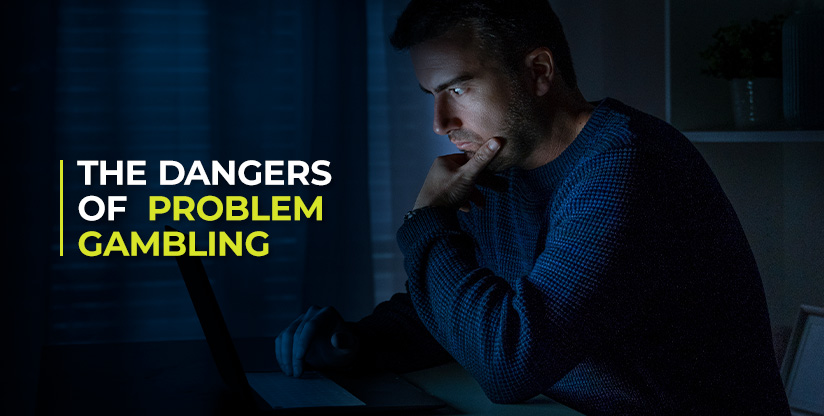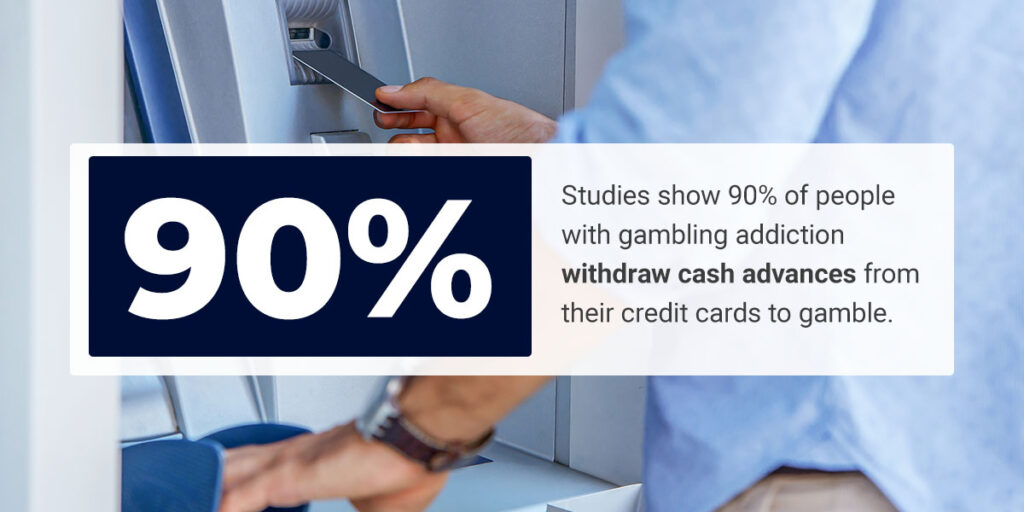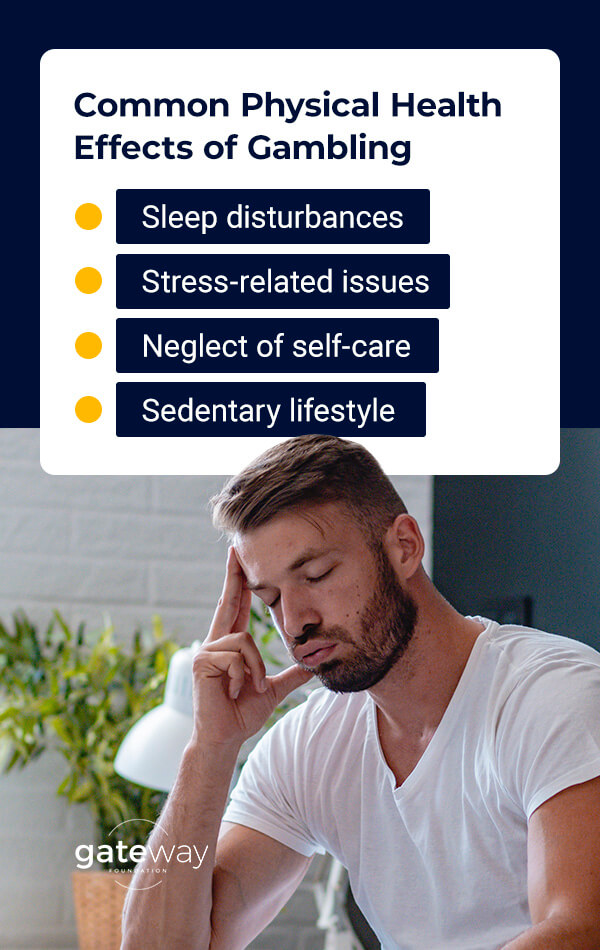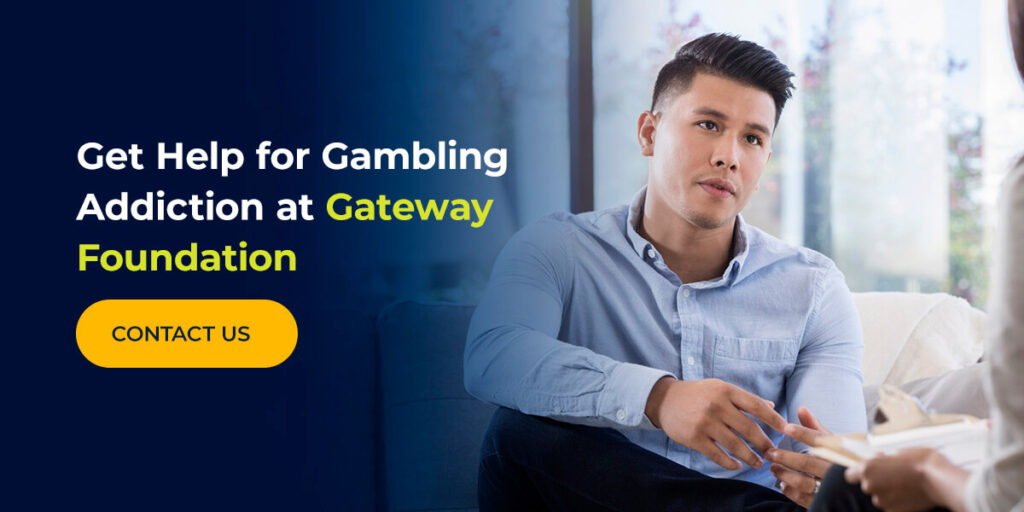- Feb 15
- Addiction

Around 2 million adults in the United States meet the criteria for severe gambling addiction. The condition can severely impact a person’s livelihood, leading to financial difficulties, strained relationships and deteriorating mental health. While the dangers of problem gambling are not always understood, looking at the risks and learning more about this complex condition can help you seek appropriate treatment.
Here’s why problem gambling can be dangerous and how to get help.
8 Reasons Why Gambling Is Dangerous
Pathological gambling can have a severe impact on a person’s well-being. It can also affect the people around a problem gambler, from family members to romantic partners and children. Getting professional treatment early can prevent these complications and improve your overall health.
Here are eight reasons why gambling is dangerous.
1. Financial Loss
One of the first complications a problem gambler experiences is financial difficulties. Gambling can stimulate the brain’s reward system, similar to drugs and alcohol.
Here’s a breakdown of the financial impact pathological gambling can have on a person:

- Job loss: Due to its psychological hold on a person, cravings and urges can cause gamblers to use the last traces of their savings to continue playing.Individuals with this addiction might also lose or surrender their jobs to continue gambling, obstructing their primary source of income.
- Heavy debt: They may continue playing even after they’ve used all of their money in an attempt to recoup the losses. Studies show 90% of people with gambling addiction withdraw cash advances from their credit cards to gamble. The average loss that sends people into debt from gambling is approximately $55,000.
- Home loss: A severe addiction can cause gamblers to lose their homes, either because they can no longer pay their mortgage or they’ve gambled it away. Those with credit card debt can also face consequences like lower credit scores and denial of loans and mortgages.
2. Relationship Strain
Problem gambling can strain relationships with family, friends and romantic partners. Individuals might lie, deceive or hide their gambling activities, leading to mistrust and communication issues.
Financial strain and emotional instability caused by compulsive gambling can also lead to arguments, conflict and, ultimately, relationship breakdowns. Individuals might lie about where their money has gone or how much they’ve spent. Discrepancies can begin to pop up in the stories they tell loved ones, and when confronted, they might become angry or hostile as a defense mechanism to hide the addiction.
Concerned family members might feel lost and unsure where to turn. Children of parents with gambling disorders can also be affected by family conflict and experience stress and anxiety.
3. Impaired Work or Academic Performance
A person’s status at work or school can also be negatively impacted by compulsive gambling. You might skip going to school or the office to continue your activities. Other responsibilities might also be affected, such as neglecting to pay bills.
Over time, a person might begin failing classes. At work, it can translate to warnings or being fired due to not doing what is expected. You might have bill collectors calling or have overdue bills in the mail.
You might also struggle to focus and become preoccupied with stress or financial worries due to pathological gambling. These symptoms can cause decreased productivity, poor job performance or academic difficulties. In the long run, it can lead to job loss, educational setbacks and professional or academic consequences.
4. Legal Troubles
Gambling can lead to various legal troubles from the compulsive behaviors associated with it. Here are a few of the common effects of gambling addiction regarding finances:
- Theft and fraud: As a last resort, gamblers might commit theft or fraud to fund their gambling or cover losses. This might involve stealing money or valuable possessions or engaging in illegal activities like embezzlement or identity theft.
- Debts and financial problems: Gambling addiction often leads to significant financial losses and debts. Individuals might be unable to pay their bills, loans or credit card debts, resulting in legal actions like lawsuits or bankruptcy filings.
- Illegal gambling activities: Some people might engage in illegal gambling activities when attempting to continue gambling or recoup losses. This could include unlicensed betting or going to unauthorized casinos or sports gambling rings.
- Legal consequences from desperation: The emotional distress and despair associated with gambling addiction can cause a person to engage in impulsive and illegal acts. This might include committing crimes of desperation like robbery or burglary to obtain money for gambling.
5. Social Isolation
Social isolation is one of the dangers of problem gambling that can often be overlooked. You might notice you no longer plan activities with friends and loved ones. You can become more withdrawn when you’re not at the casino, and all you think about is when you can get back to gambling. Gambling can serve as a distraction or a way to escape loneliness for many individuals. The more rejected they feel, the more likely they are to resort to gambling to restore a sense of control.
Gambling addiction can also bring feelings of shame or embarrassment, and many people choose to avoid friends and loved ones out of fear of confrontation or humiliation. Many gamblers participate in computer and online gambling, which can make isolation even worse. And even though gambling in casinos occurs around many people, sometimes gamblers are so immersed in the activity they fail to notice those around them.
Stress, depression and anxiety caused by gambling games and losses can cause individuals to lose interest in previously-enjoyed hobbies. Like drug or alcohol addiction, compulsive gambling affects the part of the brain that releases the feel-good hormone dopamine. After winning a bet, the brain provides that emotional reward. The longer a gambling problem continues, the more likely pleasurable activities will no longer make you feel good. You might gamble instead of participating in hobbies or hanging out with friends to get the same thrill.
6. Physical Health Risks

Health risks are another of the dangers of problem gambling. Here are some of the common physical health effects of gambling:
- Sleep disturbances: Gambling addiction can disrupt sleep patterns, causing insomnia or irregular sleep habits. Sleep deprivation can also lead to chronic health conditions, including a weakened immune system, heart disease, kidney disease and impaired cognitive function.
- Stress-related issues: Gambling often results in significant stress and anxiety due to financial losses and other negative impacts. Prolonged stress and increased cortisol can lead to disorders like gastrointestinal issues, hypertension, weakened immune function and cardiovascular problems.
- Neglect of self-care: People with pathological gambling might prioritize gambling over self-care. They may neglect basic practices like proper nutrition, exercise and hygiene — all of which can harm physical health.
- Sedentary lifestyle: Excessive gambling often involves long hours spent sitting and not moving. A lack of physical activity caused by gambling can lead to weight gain, muscle weakness, poor cardio health and increased risk of conditions like heart disease, obesity and diabetes.
7. Emotional and Mental Health Issues
Pathological gambling can lead to low self-esteem, stress, anxiety and depression. The constant cycle of winning and losing, chasing losses and dealing with the adverse impact of gambling can take a toll on one’s mental health. You might experience feelings of guilt, shame and hopelessness which can contribute to a decline in your overall well-being.
Problem gamblers can experience feelings of helplessness and hopelessness due to the loss of control the addiction can cause. The emotional impact can cause a loss of self-esteem and relationship troubles. It’s also common for individuals with gambling problems to also struggle with other mental health issues, like mood and substance use disorders.
Left untreated, the emotional and mental impact of problem gambling can worsen and lead to suicidal thoughts. One study found up to half of the people in gambling addiction treatment had suicidal thoughts and 17% of those attempted suicide. If you or a loved one is expressing thoughts of suicide, it’s crucial to call for emergency help. Addiction treatment centers can help people with a gambling disorder gain healthy coping skills and relieve thoughts of suicide and desperation.
8. Co-Occurring Addiction Risk
Gambling disorders can put individuals at risk of developing co-occurring addictions to alcohol or substances. Reasons for this might include:
- Impulsivity and peer influence: The thrill-seeking and impulsive nature of gambling can make people more prone to drug or alcohol experimentation. They might turn to substances to enhance the gambling experience or become influenced by peers in gambling environments.
- Self-medication: Substance use can also be a means of escape for people facing depression and other challenging life situations. As a result, individuals might turn to substances as a negative coping mechanism for gambling losses and other adverse impacts.
- Reward-seeking: The reward pathways activated in the brain during gambling can also be triggered by substance use. So, in situations where individuals cannot gamble, drugs or alcohol might provide the high they’re seeking, and substance use disorders can develop as a way to fulfill gambling cravings.
What to Do to Help Yourself or a Loved One
When you notice gambling is reaching a dangerous level in you or someone you know, support is available. Remember that overcoming gambling addiction takes time and commitment, but with proper help and treatment, individuals can reclaim their lives and achieve long-term recovery.
Here’s what to do if you or a loved one is struggling:
Acknowledge the Addiction
First, it’s crucial to recognize a gambling problem for what it is, which requires honesty and reflection. If someone you know is struggling, encourage them to admit the problem and let them know you support their journey to get better. Take a gentle approach when discussing any issues you notice in their life and offer support without judgment.
Educate Yourself
Learning about compulsive gambling and its causes, symptoms and effects can help you approach problem gamblers with knowledge and empathy. It can also help you recognize triggers and help them implement appropriate strategies for recovery.
Seek Professional Help
Gambling addiction is a complex disease that requires professional intervention. Encourage a loved one to seek therapy or counseling from a qualified treatment center or specialist. Look for professional guidance, resources and tools to overcome the addiction. Treatment methods can include holistic and evidence-based therapies, support groups and recreational activities. And for individuals struggling with other mental health conditions, dual-diagnosis treatment can help.
Build a Support System

If you or someone you know is experiencing gambling addiction, holding onto a healthy support system, whether friends, family members or support group peers, is crucial. A nonjudgmental environment can make all the difference for anyone experiencing addiction. Let loved ones know you are there for them and committed to their recovery. Avoid enabling behavior, like providing money to cover losses, as this can perpetuate the addiction.
Set Boundaries
If a partner or close family member is struggling, setting clear boundaries is essential. Doing so can help your loved one understand the severity of the situation and motivate them to seek help. As mentioned, avoid enabling and gently encourage the person to get help instead.
Establish Healthy Coping Mechanisms
Identifying your addiction triggers, whether a mental health condition or a specific life challenge, is essential. That way, you can develop healthy coping skills to combat stress and emotional issues healthfully. For instance, try exercise, a favorite activity or spend time with supportive friends and family members. Encourage self-care practices that can promote overall well-being.
Manage Finances
If you live with someone with a gambling addiction, encourage them to develop a responsible approach to managing finances. You might help them create a budget, limit access to money or encourage them to seek professional financial advice if needed. Limiting financial resources can reduce the risk of relapse and minimize the consequences of gambling addiction.
Attend Support Groups
You might also encourage someone with an addiction to attend support groups designed for gambling disorders. These groups provide a safe space to share experiences, gain support from peers facing similar challenges and learn from each other’s recovery journeys.
Take Care of Yourself
Supporting someone with gambling problems can lead to burnout. It’s crucial to prioritize your own well-being and seek support for yourself. You might consider joining a support group for families and loved ones of those with addiction or seeking individual counseling to cope with stress and any emotional challenges.
Celebrate Milestones
Recognize and celebrate the achievements of your loved one’s recovery journey. Acknowledge their efforts and progress, reinforce positive action and encourage them to continue their path of recovery.
Get Help for Gambling Addiction at Gateway
Problem gambling can lead to significant issues, from mental health effects to strained relationships and financial loss. Recognizing the effects of gambling can help you take the first steps toward recovery. Treatment and support can help you or a loved one overcome the challenges of gambling addiction and regain control.
At Gateway Foundation, we provide comprehensive gambling addiction treatment, including evidence-based therapies, support groups, dual-diagnosis and medication-assisted treatment. To learn more about our services, contact us today.



